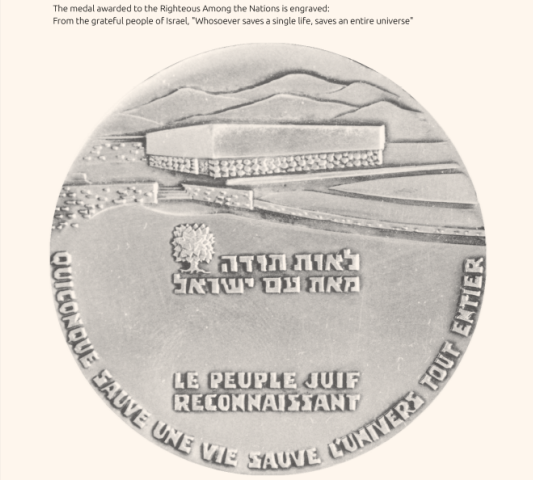After the occupation of Hungary on March 19, 1944, the Swedish delegation was under enormous pressure of Jews seeking protection in the form of passports or visas. In order to support the staff in its efforts Raoul Wallenberg was appointed Secretary in the Swedish Embassy in Budapest.
Wallenberg arrived in the Hungarian capital on 9 July 1944 with a list of Jews whom he was to help and 650 protective passports for Jews who had some connection with Sweden. However, he soon widened the scope of his work and began to issue thousands of protective letters. He also purchased houses, which he put under the Swedish flag - thus making them ex-territorial – where he hosted Jews for extra protection. About 4,500 Jews received these papers, which protected them from forced labor and exempted them from wearing the yellow star.
In October 1944, the situation in Budapest took a dramatic turn. Jews were being killed in the streets, others were dragged to the Danube river where they were shot or drowned in the freezing water. The number of Jews with protective papers quickly rose. Wallenberg used unconventional methods, including bribery and blackmail, in order to finance and run his huge rescue operation. He soon employed approximately 340 people in his office. In view of the grave situation, he began to issue protective papers without distinction, and had 32 buildings protected by Sweden, with 2 hospitals, and a soup kitchen. Wallenberg together with other legations and international organizations set up the international ghetto, protected by the neutral countries. Jewish youngsters who looked "Aryan" served as guards; some of them were especially bold and wore "Arrow Cross" uniforms.
With the establishment of the Arrow Cross rule, Eichmann returned to Budapest on 17 October 1944, and immediately ordered the deportation of the city’s Jews. The protective letters were declared null and void. After protests by Wallenberg and his colleagues, they were reinstated, although it should be noted that the Arrow Cross regime had little respect for documents and legalities. The plan to deport the Jews to the camps was paralyzed for other reasons – the railway lines were too close to the front. Not wanting to give up, Adolf Eichmann ordered a "death march" of tens of thousands of persons to the Austrian border. Wallenberg and representatives of other neutral countries followed the marchers in their vehicles, and distributed food, clothing and medications. He was able to extricate many Jews from the death march by claiming that they were his "protected" Jews. He continued to distribute passes even when the Arrow Cross guards threatened him with their guns.
Wallenberg’s bold methods put him in great danger, but he never thought of stopping. He remained in the city during the Soviet siege of Budapest with the "protected" Jews and threatened the German commander and the Arrow Cross leader not to go through with the idea to harm the remaining Jews. Before the Soviets entered the city, he told Per Anger, his colleague in the Swedish legation: “I’ve taken on this assignment, and I will never be able to go back to Stockholm without knowing inside myself that I’d done all a man could do to save as many Jews as possible”.
When the Soviets entered the city, Wallenberg was taken away by Russian soldiers supposedly to meet with the top Soviet general Malinovsky. This was on 17 January 1945. He must have felt danger, because as he was led to the Russian vehicle he said: “I don’t know whether I am being taken as a guest of the Soviets or as their prisoner”. Wallenberg, who was 32 years old at the time, was never seen again.
In 1989 Wallenberg’s diplomatic passport, cigarette case and other items came to light in the basement of the KGB headquarters in Moscow and were returned to his family. Yielding to political pressure a Russian-Swedish working group was created, and its findings were submitted in 2000. By now 55 years had passed since his disappearance. The working group confirmed that Wallenberg had probably died in prison in 1947; no definite conclusion had been reached as to the circumstances of his arrest, death and the Soviet regime’s refusal to reveal the details of his fate.

In order to pay tribute to the immense bravery of Wallenberg and other diplomats that were declared Righteous Among the Nations and in honour of International Holocaust Remembrance Day 2018 the Mission of Israel to the EU & NATO in cooperation with the European External Action Service launched the exhibition “Beyond Duty – Diplomats Recognized as Righteous Among the Nations” at the EEAS HQ in Brussels. Learn more about the exhibition here
In cooperation with the AJC Transatlantic Institute and the Konrad Adenauer Stiftung the Mission also organized the screening of the German movie “The Invisibles” about the life of 4 Jews that became “invisible” in order to survive in “Jew-free” Berlin. Following the film survivor Hanni Levy, one of the 4 youngsters, told her story to a broad audience from young to old.